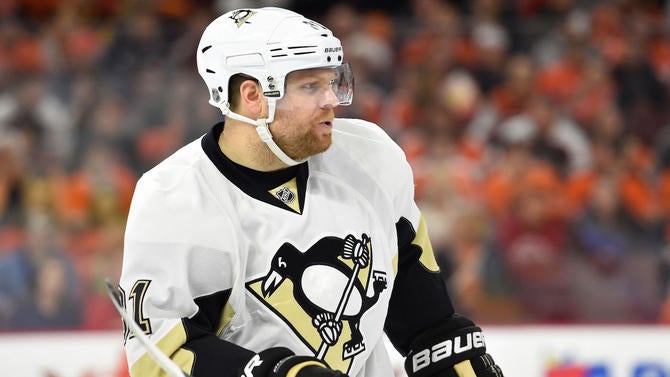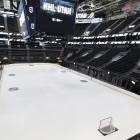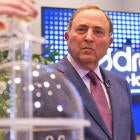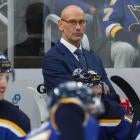The Pittsburgh Penguins have been a far more successful playoff team in the Sidney Crosby-Evgeni Malkin era than they are often times given credit for being.
After defeating the Tampa Bay Lightning in Game 7 of the Eastern Conference finals, they are on their way to their third Stanley Cup Final since the 2005-06 season where they will face the San Jose Sharks. Three Cup Final appearances since '05 is tied for the most in the NHL over that stretch (the Blackhawks Chicago also have three appearances), while only three other teams (the Los Angeles Kings, Boston Bruins and Detroit Red Wings) have appeared in more than one. The Penguins currently have 71 playoff wins over that same time period, second most in the league behind only the Blackhawks' 76. Those are impressive numbers.
But because it has taken them seven years to get back to the Final, and because they don't have as many Stanley Cup wins as they were expected to have at this point in the Crosby-Malkin era, they have been tagged with the underachiever label whether it is fair or not.
There are a lot of reasons it has taken them this long to get back. Sometimes it has been injuries, sometimes it has been goaltending, sometimes it has just been a matter of them simply running into a better team.
So how did the Penguins end up getting back to the Stanley Cup Final in 2015-16? Here are four of the biggest reasons.
1. It hasn't had to be all about Sidney Crosby and Evgeni Malkin. Make no mistake, Crosby and Malkin are a big part of this. They each have 15 points in 18 playoff games this year, Crosby has three game-winning goals, Malkin closed the Eastern Conference finals on a five-game point streak that included a pair of assists in Game 7, and they are two of Penguins' three leading scorers.
You need performances like that to win.
But these guys have always scored in the playoffs and put up big numbers. Their career points per game averages in the playoffs are among the best ever (they are the only two active players in the top-30 on the all-time list), and even if you only look at the years since their 2009 Stanley Cup win they are still among the best in hockey among active players. For as good as they have been and for as good as they still are, they are just like any other superstar player in the league in the sense that they will get shut down from time-to-time. When that has happened in recent years the Penguins have had nobody else to pick up the scoring and the team would simply not have anywhere near enough offense to win. That is not the case with this team. When Crosby and Malkin get shut down, or when they are going up against the other team's top players in an effort to neutralize them, there are two other lines on the team that can score. That is huge.
When Crosby and Malkin combined for just a single goal in their second round series against the Washington Capitals it was huge deal, but for all of the wrong reasons. All of the focus was on how Crosby and Malkin need to score for the Penguins to win. Instead, it should have been on how the Penguins have evolved into a team that is not entirely dependent on two players to provide all of the offense. This is the way the playoffs are supposed to work.

2. Phil Kessel and the HBK line. Speaking of secondary scoring, let's talk about Phil Kessel and what his line has meant to the Penguins. Technically speaking it is their "third" line because it does not have Crosby or Malkin on it, but the line of Kessel, Nick Bonino, and Carl Hagelin, all of whom were acquired in separate trades over the past year, has been perhaps their best line over the past two months. It has been so good that it has made a former pro wrestler a storyline in the Stanley Cup playoffs.
Through the first three rounds Kessel has 18 points (nine goals, nine assists) in 18 playoff games to lead the Penguins in scoring and remains a point-per-game postseason player in his career. His play this postseason is finally earning him the respect he has probably always deserved as one of the NHL's best goal scorers.
We mentioned secondary scoring as the No. 1 factor for the Penguins during this postseason run. When the Penguins won the Stanley Cup in 2009 they had what was probably the best third line in hockey with Jordan Staal, Matt Cooke and Tyler Kennedy, a line that was more about defense and playing shut down minutes. They once again have the best "third" line in hockey, only this time it is more about scoring goals and creating offense.
3. Matt Murray has taken over in net. If a lack of scoring depth didn't hurt the Penguins during some of their recent postseason runs, goaltending did. Marc-Andre Fleury is a Stanley Cup champion (and he was a big part of that) and was significantly better in the 2014 and 2015 playoffs, but in the four postseasons between those years (2010, 2011, 2012 and 2013) his play was, to say the least, not good, and in pretty much every series the Penguins were on the wrong end of the goaltending matchup.
When the 2016 playoffs began the Penguins were again looking at a tough goaltending situation because Fleury and Matt Murray were sidelined with injuries. Fleury was recovering from his second concussion of the season, while Murray was dealing with an upper body injury from the regular season finale. After Jeff Zatkoff started the first two games of the first round against the New York Rangers, Murray took over the crease once he was cleared to play. He has done nothing to give it back.
Through the first three rounds Murray has a .924 save percentage and is perhaps the biggest reason the Penguins were able to beat the Presidents' Trophy winning Capitals in round two. He outplayed Henrik Lundqvist and Braden Holtby in the first rounds, and even though his play slipped a bit in round three against Tampa Bay and he was outplayed by Andrei Vasilevskiy, he never really did anything to lose a game and the team in front of him was so much better the Penguins were still able to win the series.
4. Speed. Speed. And more speed. The Penguins are not the biggest team, or the strongest team, or the most physical team. They are not going to try and wear teams down physically. Their competitive advantage is in their speed, and it is a big part of why they are in the Stanley Cup Final. When it comes to this Penguins season the obvious turning point is when they changed coaches in mid-December and brought in Mike Sullivan to replace Mike Johnston. It has turned out to be a huge move. But it wasn't just that move that has made a difference. It was right around the time of the coaching change they also started to overhaul their roster to make them faster group by acquiring Trevor Daley to help strengthen the defense, traded for Hagelin, and called up a bunch of players from Wilkes-Barre/Scranton in the AHL, including Conor Sheary, Tom Kuhnhackl and Bryan Rust, the unlikely Game 7 star in the Eastern Conference finals.
All of those moves have helped give the Penguins an obvious strength and identity, and nobody has really been able to contain it.
Their speed advantage was obvious in the first two rounds against the Rangers and Capitals, and even though Tampa Bay was a team that was able to keep up with them, the Penguins still proved to be too much.






















